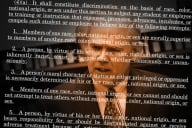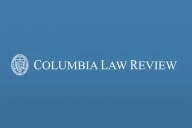You have /5 articles left.
Sign up for a free account or log in.
Social scientists are expanding their criticism of the controversial New Family Structures Survey to a professor who defended it, saying he failed to disclose his involvement with the conservative organization that funded the study -- even though the information has been available for nearly six months.
Walter R. Schumm, professor of family studies at Kansas State University, was one of few scholars to defend the work of Mark Regnerus, associate professor of sociology at the University of Texas at Austin. Regnerus authored the original study that suggested children raised in same-sex households were less likely than children of opposite-sex couples to succeed as adults. The study was published in the in the July 2012 issue of Social Science Research.
Schumm’s commentary appeared alongside other responses in the November issue. Noting the unpopularity of Regnerus’s findings, Schumm wrote “the methodological decisions he made in the design and implementation of the New Family Structures Survey were not uncommon among social scientists, including many progressive, gay and lesbian scholars."
Critics of same-sex marriage have been trying to argue that the research about the impact of such unions on children is still an open question, so having someone defend Regnerus bolstered that idea. Many others have argued that in fact there is a consensus that same-sex parents aren't better or worse than other parents, and that only a few outliers disagree.
But in an article published in the same month as his commentary, Schumm is described as having “served as a paid consultant (6-7 days) in the early stages of the development of the [study].” Although the information has been available for months, social scientists have only recently faulted Schumm for not disclosing his relationship with the Witherspoon Institute, a conservative think tank that opposes same-sex marriage. The foundation backed Regnerus’s study with a $750,000 grant. Neither potential conflict was mentioned in Social Science Research.
Neal Caren, assistant professor of sociology at the University of North Carolina at Chapel Hill, called the conflict of interest a “huge problem” that strips the legitimacy from Schumm’s defense of Regnerus’s study.
“I think there’s a fundamental difference between having pre-existing biases or beliefs and actually working on a specific project, which you then praise as saying is a great project -- without disclosing the fact that you worked on it,” Caren said.
Schumm said the criticism was “kind of laughable.”
“If folks want to discredit me, I suggest they try refuting what I said rather than making ad hominem comments,” he said.
Due to the political divisiveness of same-sex marriage, Schumm said proponents of either side aren’t being consistent in their criticism of their opponents.
“There are dozens and dozens of articles that are being written that are funded by different organizations,” Schumm said. “If a gay scholar can get money from pro-gay group and say he’s not influenced by it, I don’t see why a conservative scholar can get money from an organization and say he’s not influenced by it.”
Caren said the controversy surrounding Regnerus’s study is to blame for the delayed response, as it diverted scholars’ attention away from the commentaries.
Regnerus’s study ignited a firestorm of criticism after it was published. UT-Austin launched an inquiry into the case -- which was later dropped -- and the American Sociological Association discounted Regnerus’s findings in an amicus brief filed to the U.S. Supreme Court ahead of the court’s hearings on same-sex issues in March. Regnerus, meanwhile, quoted Schumm in an amicus brief he co-authored.
Even Regnerus’s colleagues joined the fray, bashing his “irresponsible and reckless representation of social science research."
Bloggers have called for Social Science Research to retract Schumm's commentary, but editor-in-chief James D. Wright, professor of sociology at the University of Central Florida, said the editorial board has not discussed doing so.
“I assumed then and now that all of the unsolicited comments were motivated by some sort of stake in the issue,” Wright said in an e-mail. He added that he has no opinion about whether Schumm should have clarified his involvement with the Witherspoon Institute.








